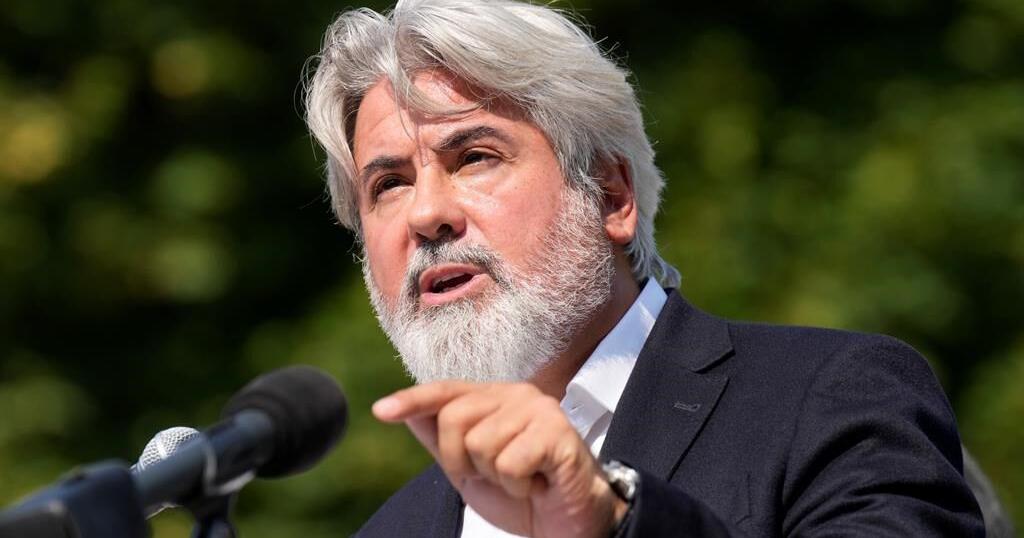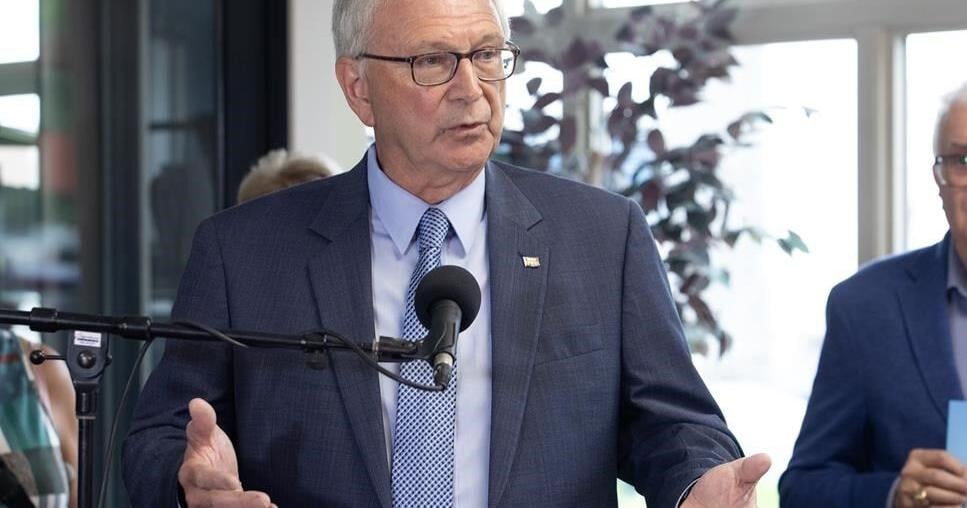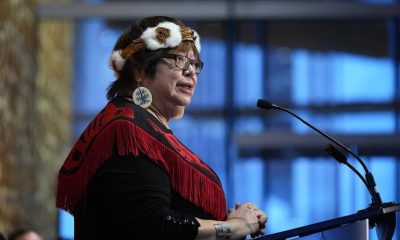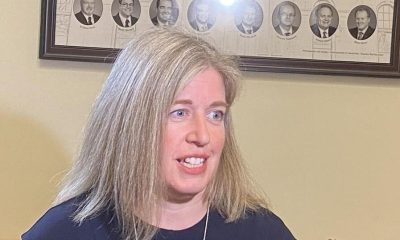OTTAWA — If members of Parliament do not avoid the dangers of “performance politics” and chasing “likes” on social media, future Canadians will look back on the current moment as the start of the country’s decline, Erin O’Toole warned Monday.
Politics
Social media starting to ‘tear down’ Canada’s democracy, O’Toole warns in final Commons address
“We are becoming elected officials who judge our self-worth by how many ‘likes’ we get on social media, but now not how many lives we change in the real world.”
“Performance politics is fuelling polarization. Virtue-signalling is replacing discussion and far too often we’re just using this Chamber to generate clips, not to start national debates.”
O’Toole is retiring from federal politics at the end of the month after first being elected in a byelection in 2012. From there, the lawyer and former Royal Canadian Air Force member served as parliamentary secretary to Ed Fast, then-trade minister in the former Conservative government of Stephen Harper.
Conservative Leader Pierre Poilievre — whom the party elected after its MPs voted O’Toole out in early 2022 following months of internal strife and losing the 2021 federal election — told the Commons on Monday that O’Toole “remains a statesman in our party” and thanked him for his public service.
He has said he accepts the outcome of of the election.
Since being ousted by his caucus, O’Toole has kept a low profile in Parliament save for some of his writings. In late December 2022, he penned a post saying he wished the coming year would bring with it more civilized political rhetoric, specifically calling out the expletive-laden flags about Trudeau, which became one of the most memorable images of the 2022 “Freedom Convoy.”
He cautioned that if Parliament is not careful there will be a future generation of voters who have not heard a viewpoint different than their own.
“Today, too often, we’re allowing conspiracy theories about the UN or the World Economic Forum go unchallenged,” O’Toole said.
“We’re becoming followers of our followers when we should be leaders.”

Politics
New Brunswick election profile: Progressive Conservative Leader Blaine Higgs

FREDERICTON – A look at Blaine Higgs, leader of the Progressive Conservative Party of New Brunswick.
Born: March 1, 1954.
Early years: The son of a customs officer, he grew up in Forest City, N.B., near the Canada-U.S. border.
Education: Graduated from the University of New Brunswick with a degree in mechanical engineering in 1977.
Family: Married his high-school sweetheart, Marcia, and settled in Saint John, N.B., where they had four daughters: Lindsey, Laura, Sarah and Rachel.
Before politics: Hired by Irving Oil a week after he graduated from university and was eventually promoted to director of distribution. Worked for 33 years at the company.
Politics: Elected to the legislature in 2010 and later served as finance minister under former Progressive Conservative Premier David Alward. Elected Tory leader in 2016 and has been premier since 2018.
Quote: “I’ve always felt parents should play the main role in raising children. No one is denying gender diversity is real. But we need to figure out how to manage it.” — Blaine Higgs in a year-end interview in 2023, explaining changes to school policies about gender identity.
This report by The Canadian Press was first published Sept. 19, 2024.
The Canadian Press. All rights reserved.
Politics
Anita Anand taking on transport portfolio after Pablo Rodriguez leaves cabinet

GATINEAU, Que. – Treasury Board President Anita Anand will take on the additional role of transport minister this afternoon, after Pablo Rodriguez resigned from cabinet to run for the Quebec Liberal leadership.
A government source who was not authorized to speak publicly says Anand will be sworn in at a small ceremony at Rideau Hall.
Public Services and Procurement Minister Jean-Yves Duclos will become the government’s new Quebec lieutenant, but he is not expected to be at the ceremony because that is not an official role in cabinet.
Rodriguez announced this morning that he’s leaving cabinet and the federal Liberal caucus and will sit as an Independent member of Parliament until January.
That’s when the Quebec Liberal leadership race is set to officially begin.
Rodriguez says sitting as an Independent will allow him to focus on his own vision, but he plans to vote with the Liberals on a non-confidence motion next week.
This report by The Canadian Press was first published Sept. 19, 2024.
The Canadian Press. All rights reserved.
Politics
New Brunswick Premier Blaine Higgs kicks off provincial election campaign

FREDERICTON – New Brunswick Premier Blaine Higgs has called an election for Oct. 21, signalling the beginning of a 33-day campaign expected to focus on pocketbook issues and the government’s provocative approach to gender identity policies.
The 70-year-old Progressive Conservative leader, who is seeking a third term in office, has attracted national attention by requiring teachers to get parental consent before they can use the preferred names and pronouns of young students.
More recently, however, the former Irving Oil executive has tried to win over inflation-weary voters by promising to lower the provincial harmonized sales tax by two percentage points to 13 per cent if re-elected.
At dissolution, the Conservatives held 25 seats in the 49-seat legislature. The Liberals held 16 seats, the Greens had three and there was one Independent and four vacancies.
J.P. Lewis, a political science professor at the University of New Brunswick, said the top three issues facing New Brunswickers are affordability, health care and education.
“Across many jurisdictions, affordability is the top concern — cost of living, housing prices, things like that,” he said.
Richard Saillant, an economist and former vice-president of Université de Moncton, said the Tories’ pledge to lower the HST represents a costly promise.
“I don’t think there’s that much room for that,” he said. “I’m not entirely clear that they can do so without producing a greater deficit.” Saillant also pointed to mounting pressures to invest more in health care, education and housing, all of which are facing increasing demands from a growing population.
Higgs’s main rivals are Liberal Leader Susan Holt and Green Party Leader David Coon. Both are focusing on economic and social issues.
Holt has promised to impose a rent cap and roll out a subsidized school food program. The Liberals also want to open at least 30 community health clinics over the next four years.
Coon has said a Green government would create an “electricity support program,” which would give families earning less than $70,000 annually about $25 per month to offset “unprecedented” rate increases.
Higgs first came to power in 2018, when the Tories formed the province’s first minority government in 100 years. In 2020, he called a snap election — the first province to go to the polls after the start of the COVID-19 pandemic — and won a majority.
Since then, several well-known cabinet ministers and caucus members have stepped down after clashing with Higgs, some of them citing what they described as an authoritarian leadership style and a focus on policies that represent a hard shift to the right side of the political spectrum.
Lewis said the Progressive Conservatives are in the “midst of reinvention.”
“It appears he’s shaping the party now, really in the mould of his world views,” Lewis said. “Even though (Progressive Conservatives) have been down in the polls, I still think that they’re very competitive.”
Meanwhile, the legislature remained divided along linguistic lines. The Tories dominate in English-speaking ridings in central and southern parts of the province, while the Liberals held most French-speaking ridings in the north.
The drama within the party began in October 2022 when the province’s outspoken education minister, Dominic Cardy, resigned from cabinet, saying he could no longer tolerate the premier’s leadership style. In his resignation letter, Cardy cited controversial plans to reform French-language education. The government eventually stepped back those plans.
A series of resignations followed last year when the Higgs government announced changes to Policy 713, which now requires students under 16 who are exploring their gender identity to get their parents’ consent before teachers can use their preferred first names or pronouns — a reversal of the previous practice.
When several Tory lawmakers voted with the opposition to call for an external review of the change, Higgs dropped dissenters from his cabinet. And a bid by some party members to trigger a leadership review went nowhere.
This report by The Canadian Press was first published Sept. 19, 2024.
-

 Politics7 hours ago
Politics7 hours agoNew Brunswick Premier Blaine Higgs expected to call provincial election today
-
Media7 hours ago
Sutherland House Experts Book Publishing Launches To Empower Quiet Experts
-

 News19 hours ago
News19 hours agoAlberta Premier Smith aims to help fund private school construction
-

 News7 hours ago
News7 hours agoQuebec won’t fund graphite mine project tied to Pentagon; locals claim ‘victory’
-

 News19 hours ago
News19 hours agoNova Scotia NDP accuse government of prioritizing landlord profits over renters
-

 Economy19 hours ago
Economy19 hours agoN.B. election: Parties’ answers on treaty rights, taxes, Indigenous participation
-

 News19 hours ago
News19 hours agoHealth Minister Mark Holland appeals to Senate not to amend pharmacare bill
-

 Sports6 hours ago
Sports6 hours agoCanada to face three-time champion Germany in Davis Cup quarterfinals




























